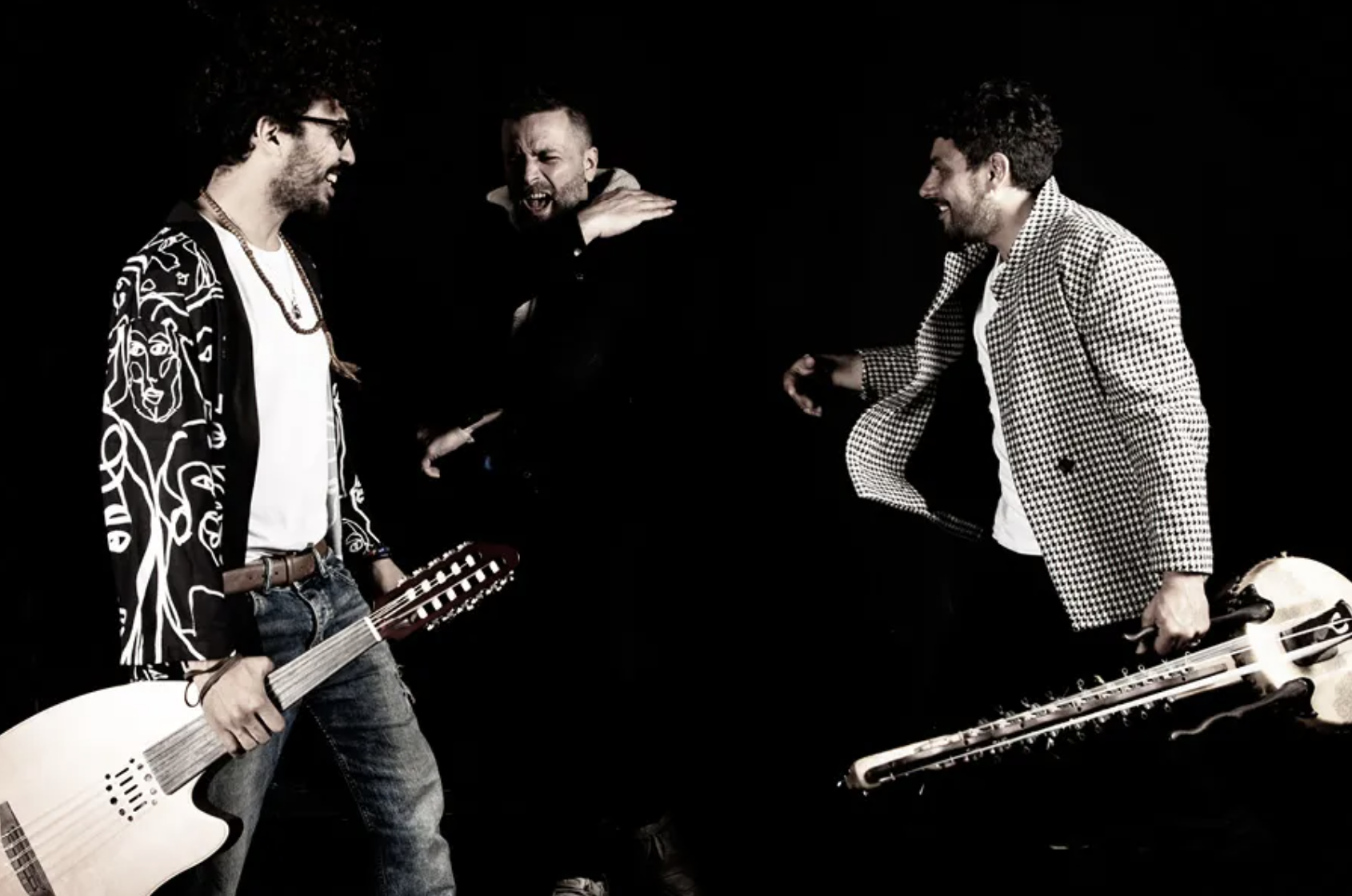At Vancouver Folk Music Festival, Zar Electrik blends traditional sounds with electronic futurism
The Marseille trio—Arthur Peneau, Didier Simione, and Anass Zine—draws on instruments and sounds from Africa and beyond
Zar Electrik.
The Vancouver Folk Music Festival presents Zar Electrik on July 20
MARSEILLE, SAYS ZAR Electrik’s Arthur Peneau, is “a place with a lot of culture, a cosmopolitan city with a crazy dynamic”. And one would expect no less from France’s prime Mediterranean port, which for centuries has been a place of adventure and sanctuary. A trading hub since it was established by Greek settlers in approximately 600 BC, it is the oldest city in France and home to Europe’s third-largest Jewish community. Its reputation for tolerance, however, has come under stress in recent years, as a new wave of economic, political, and environmental refugees from North Africa and the Middle East has arrived. Cultural friction, aggravated by youth unemployment as high as 40 percent in some immigrant communities, has at times led, literally, to fighting in the streets.
But there’s also been dancing in the streets, and when that happens Zar Electrik can often be found at its centre. The trio—which plays the Vancouver Folk Music Festival on Saturday (July 20) and will then join Inuit duo PIQSIQ at the Fox Cabaret on Wednesday (July 24)—offers an innovative blend of traditional sounds and electronic futurism that mirrors its makeup. The French-born Peneau, a multi-instrumentalist who’s spent considerable time in West Africa, has settled on the harp-like kora as his main focus, but plays an amplified version that sports a decidedly sci-fi look. His countryman Didier Simione, a trained composer, plays drums, drum machines, loops, samples, and computers. And Moroccan immigrant Anass Zine doubles on guembri, the funkiest bass generator this side of Bootsy Collins’s custom-made bass guitar, and a Canadian-made Godin MultiOud, which adds amplification and effects to the classic Middle Eastern lute.
They all sing, and beautifully—as demonstrated by the opening track on their 2023 EP, Hawa. Admittedly, “Intro” is a bit of a curveball. Zine enters in a somewhat meditative mood, his oud swathed in reverb, and for a moment one fears that what will follow will be New Age fusion, a soft-focus take on multiculturalism meant to be played in coffee-chain stores. That impression isn’t entirely dispelled when Peneau and Simione join him in three-part harmony; at least some of these musicians, it appears, have spent time in boys’ choirs. There’s an edge to the electronic glissandos that underpin their singing, however, and darker drones set the tone for the title track, which to these ears shows the debt that a lot of Northern Mediterranean music owes to the muezzins of the Islamic south.
If you’re reminded of the music of Sicily and Sardinia, that’s just an indication that your ears are working—and a hint that Zar Electrik’s crossover sound is both futuristic and nothing new. The Mediterranean has long been a place of intertwined cultures. And if you’re reminded of the music of West Africa, that’s also correct: the griots and Sufi mystics of Mali and Senegal are echoed here, too.
“We use lyrics from old songs but we compose all the music,”says Peneau, interviewed with Zine as they’re en route to a festival show in Quebec City. “And sometimes we write texts about our life, but we like to these old songs because there’s some beautiful stuff already composed.
“It’s beautiful, so we have to use it, too,” he adds.
Hawa’s “Sadiyé”, which sets a rippling kora to a powerful bass-synth foundation, is a good example. “It’s like a gnawa song, but it’s our version,” says Zine, referring to an ecstatic religious tradition of Morocco. “This song, we’ve changed a lot of the words and the rhythm and the melody. But it is originally from gnawa music.”
Zar Electrik itself takes its name from zar, a similar tradition of trance music, ritual, and healing found on the shores of the Red Sea, and although live videos of the group demonstrate that its three musicians are all adept at getting parties started, there’s also a serious intent behind the festive atmosphere. At a time when ethnic tensions and economic injustices are fuelling a revival of fascism in France, the band’s message is that the clocks can’t be turned back, and that their country has to live gracefully with its new multicultural identity—an identity that’s maybe not so new in the city they call home.
“You’re talking about what happened last week?” says Peneau, referring to the recent French election. “Yeah! We are really happy about that but at the same time this nationalist party doubled its vote, so we have to be aware of that.
“And it’s not only in Europe,” Zine adds. “So it’s maybe our message to tell that in our music. We kind of mix a lot of cultures in our music, because that is our world. We sing a lot about family, about life, about being alive and feeling the music and feeling love—and about how we can live together.”













